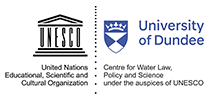Hydro Nation Virtual Water Pavilion
Scotland’s Hydro Nation Strategy was established in 2012, to fulfil the statutory duty on Scottish Ministers to ensure “the development of the value of Scotland's water resources". In the context of climate change, this means that we recognise the importance of responsible stewardship of our water resources to delivering an innovative water sector that supports a flourishing low-carbon economy and plays a crucial role in international development support.
The Hydro Nation Virtual Experience highlights some key examples of this activity and features six tours themed on key areas of Scotland’s Hydro Nation delivery. Please take some time to explore the content and immerse yourself in Scotland’s iconic water landscapes.
You will also find a planner and information on key waters-related events at the conference to assist you in planning your COP26 around water.

The Water Resilience Assessment Framework (WRAF) is a high-level framework that seeks to prevent shocks and stresses from becoming crises. It aims to facilitate a shared understanding of water system resilience and allow practitioners to develop common measurable goals and outcomes for stakeholder and resilience planning. The WRAF guides users through a process of visualizing the system, developing a resilience strategy, testing the resilience strategy and evaluating the outcomes in order to build system-wide resilience. The WRAF makes resilience a predictable outcome in an unpredictable world, which is increasingly important as climate change continues to alter how we make water management decisions. This session will seek to explore the bounds of resilience thinking and seek input on how to continue to grow and foster resilience.
The session will introduce the framework and how it can be used to build resilience and support climate change adaptation goals. A panel of cross-sectoral experts will further elaborate on the gap that the WRAF fills and how they would use it in their own work. Concluding remarks will focus on the path forward and a call to action
More information at - https://bit.ly/3jL63s0
Aiming to put forward the question of leadership and recognize those who drive change on the ground, the event will present the journeys of Water ChangeMaker Awards winners. The theme of the day focuses on Adaptation & Resilience and the stories presented will bring excellent insights specifically around climate change and resilient water management, solving challenges by uniting through action.
Water Pavilion: Virtual Meeting Details (waterforclimate.net)
Join the launch of the Glasgow Declaration for Fair Water Footprints at COP26, a breakthrough moment for climate resilience and global water justice. The Declaration follows the call to action from UK Minister Lord Goldsmith in August to ensure responsible water use throughout our globalised supply chains, to protect nature and human rights, and accelerate attainment of the Global Goals. The founding signatories, including the governments of the UK, Malawi, Peru, Madagascar and Finland together with progressive companies and financiers are committed to zero pollution, sustainable withdrawals, full WASH access, nature-based solutions and drought and flood mitigation within their supply chains by 2030, and invite all stakeholders to join them, to lead us to the fairer water future we all need.
More information at - https://bit.ly/3jKhGzx
Highlighting the critical role of water in relation to both Adaptation and Loss and Damage is essential if practical solutions are to be found. This session draws on the breadth of expertise and experience in the UNESCO Water Family and examines possible ways forward from around the world, especially in relation to governance.
Watch live: Climate Change and Water: The Missing Agenda at COP26 on Vimeo
Questions can be tweeted to: @dundeewater
|
Organisers: RAMSAR Convention; BirdLife International; International Union for Conservation of Nature (IUCN); International Water Management Institute (IWMI); Wetlands International (WI); Wildfowl & Wetlands Trust (WWT); World
https://globalpeatlands.online/PeatlandPavilionCOP26Registration
It's vital for us to reimagine the way we live to support responsible consumption and tackle the climate crisis. Scotland can lead the way, embedding the circular economy in towns, cities and regions. Zero Waste Scotland is working with councils, local authorities and businesses to drive this shift.
Register to attend
Register to attend these events on eventsair - a Scottish Government partner website. You'll need to create an account to attend.
This event showcases the UK’s proactive steps to build adaptive capacity and reduce climate risk to communities both domestically and internationally through risk assessments, action-oriented research and knowledge exchange. The panel discussion will draw on findings from the third Independent Assessment of UK Climate Risk published in 2021. The event is co-organised by Defra, FCDO, CCC, the Met Office and the University of Exeter.
Speakers:
- Jo Churchill MP is the Parliamentary Under Secretary of State at the Department for Environment, Food & Rural Affairs (Defra).
- Professor Gideon Henderson, CSA, Defra.
- Dr Rosalind West, Foreign, Commonwealth & Development Office (FCDO)
- Dr Ana Maria Loboguerrero Rodriguez, Head of Global Policy Research, International Center for Tropical Agriculture
- Baroness Brown, Chair, Adaptation Committee, UK Climate Change Committee
- Professor Richard Betts, Head of Climate Impacts Research at the Met Office Hadley Centre and Char in Climate Impacts at the University of Exeter
Further information:
- This event will be held in the blue zone at COP26 and therefore in person attendance will require accreditation, these are not open to the public.
-
- To note: These tickets can't guarantee in-person attendance as there is a limit to the room capacity.
- A breakfast reception will precede this event from 8:00-9:00, showcasing video materials from our co-organisers with an opportunity to socialise. Refreshments will be provided.
COP26 - Climate Risk and Adaptation Tickets, Mon 8 Nov 2021 at 09:00 | Eventbrite
This event at COP26 will showcase a new capacity building program under the leadership of the UNFCCC. The CASTT Adaptation Academy provides in-depth training and cross-country exchanges to those involved in national adaptation planning, implementation, and reporting. The event will highlight the Adaptation Academy’s value in building a community of practice among national adaptation focal points and others involved in climate programs.
Water Pavilion: Virtual Meeting Details (waterforclimate.net)




